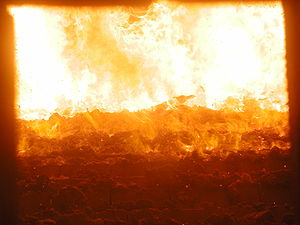
- Image via Wikipedia
Carsten Beier from the Fraunhofer Institute for Environmental, Safety and Energy Technology UMSICHT in Oberhausen, Germany does not believe that “anyone would burn a 50-dollar bill just to keep warm. It’s obvious that it simply is too valuable for that.” But, in contrast to dollar bills, most energy carriers are all too frequently burned for less than they are worth. Take wood, for example. Beier and his colleagues have analyzed the efficiency of heat supply systems and he explains that “wood is a high-quality fuel that can be compared to natural gas. With adequate technologies we could utilize it for power generation. As a fuel, there’s a lot more in wood that we are taking advantage of at the moment.”
Beyond this, the researchers at the Fraunhofer Institute for Environmental, Safety and Energy Technology have come up with a model for comparing various systems and technologies in heat supply ranging from heating boilers for single-family dwellings right down to district heating networks for whole cities. They apply exergy as a criterion of analysis which is a thermodynamic parameter defined by the quantity and quality of an energy. In contrast to the CO2 balance sheet and primary energy consumption, the exergy analysis indicates whether we are sufficiently taking advantage of the potential lying dormant in the energies we use. Carsten Beier has come to the conclusion that “if we used fuels such as natural gas or wood for power generation and only use the waste heat for heating, we would be able to save large quantities of primary energy and avoid generating CO2 emissions.”









